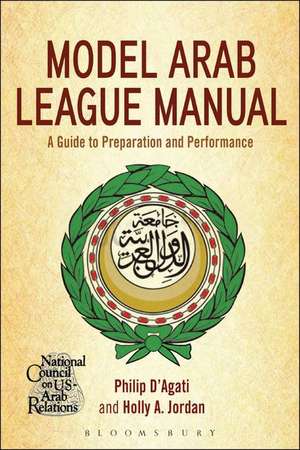The Model Arab League Manual: A Guide to Preparation and Performance
Autor Philip D’Agati, Holly A. Jordanen Limba Engleză Hardback – 4 noi 2015
Preț: 268.91 lei
Nou
Puncte Express: 403
Preț estimativ în valută:
51.47€ • 53.04$ • 43.45£
51.47€ • 53.04$ • 43.45£
Carte nepublicată încă
Doresc să fiu notificat când acest titlu va fi disponibil:
Se trimite...
Preluare comenzi: 021 569.72.76
Specificații
ISBN-13: 9781628926019
ISBN-10: 1628926015
Pagini: 224
Dimensiuni: 152 x 229 mm
Greutate: 0.46 kg
Editura: Bloomsbury Publishing
Colecția Bloomsbury Academic
Locul publicării:London, United Kingdom
ISBN-10: 1628926015
Pagini: 224
Dimensiuni: 152 x 229 mm
Greutate: 0.46 kg
Editura: Bloomsbury Publishing
Colecția Bloomsbury Academic
Locul publicării:London, United Kingdom
Caracteristici
Instructs students and advisers on effective strategies for creating, maintaining, and developing a Model Arab League program
Notă biografică
Philip D’Agati is Professor of Nationalism, Olympics, and International Relations at Northeastern University, USA. He advises Northeastern’s nationally recognized MAL and M-NATO teams. He is a member of the Advisory Board of NCUSAR. Holly A. Jordan is a Ph.D. Candidate at Virginia Polytechnic Institute and State University, Blacksburg, USA and serves as Visiting Assistant Professor, Department of Religion and Philosophy, Roanoke College, Salem, USA.
Cuprins
PrefaceAcknowledgements Chapter 1: Introduction to the League and the Model LeagueHistory of the programNCUSAR’s Model Arab League Conference ProgramWhat is the League of Arab StatesLeague SuccessesSummary Chapter 2: Conference Structure: Councils, Leadership and GuidelinesCouncils – Types of CouncilsPlayers at the ConferenceWhat to Expect at Conference Awards – What They Are and How They WorkJoint Cabinet Crisis SimulationArab Court of JusticePress CorpsSummaryChapter 3: Representing a CountryStaying in CharacterBeing a DiplomatRepresenting Challenging StatesObserver StatesResolution WritingStrategies for Success and Winning AwardsSummaryChapter 4: The Rules of ProcedureThe Logic of the Rules of ProcedureAlphabetical Listing of the Rules of Procedure with Detailed Explanations Manipulating the RulesSummary Chapter 5: Research: How Do You Prepare to Represent a Specific CountryHow to Research Your CountryHow to Interpret an AgendaWhat to Put in Your “Conference Binder”SummaryChapter 6: Conference Leadership: How to Prep as a Chair/SecretariatTips for Effective ChairingHow to Prepare as a Chair/SecretariatSummaryChapter 7: The Logistics of Running a TeamHow to Structure Your Program: Club, Class, Hybrid OptionsRecruitmentHow to Find FundingEffective Team PoliciesRunning PracticesPlacing Context on Winning, Losing, and the Outcome of ConferenceSummary Chapter 8: The Role of the Faculty Advisor at ConferenceObserving Your TeamProviding Advice and ExpertiseAdvocating on Behalf of Your School and StudentsMaintaining Your Team’s Reputation at ConferencesSummary Chapter 9: Model Arab League as a Course Establishing Learning ObjectivesLearning Assessment and GradingHow to Teach Parliamentary ProcedureHow to Teach Resolution WritingSuggested ReadingsSample SyllabusSummaryWorks Cited Glossary of Terms Appendices Section 1: Important TreatiesAppendix A: Alexandria Protocol Appendix B: Pact of the League of Arab StatesAppendix C: Joint Defense and Economic Cooperation Treaty (JDEC)Appendix D: Sykes-Picot AgreementAppendix E: Montevideo Convention on the Rights and Duties of States Appendix F: Arab Charter on Human Rights Appendices Section 2: Official Policies of the Model Arab League ProgramAppendix G: NCUSAR Policies and Regulations Governing all Model Arab League ProgramsAppendix H: Model Arab League Rules and ProceduresAppendix I: Statute of the Arab Court of JusticeAppendices Section 3: Sample Session and DocumentsAppendix J: Scripted Committee SessionAppendix K: Annotated ResolutionAppendix L: Sample MemorialAppendix M: Sample Counter MemorialAppendix N: Sample Formal Topic GuideAppendices Section 4: Reference DocumentsAppendix O: Rules of Procedure Cheat SheetAppendix P: Rules of Procedure Precedence Cheat SheetAppendix Q: One-Half and Two-Thirds Voting ChartAppendix R: Preamble and Operative Clause Starting Word ListIndex
Recenzii
D'Agati and Jordan have produced what can only be described as an essential resource for students and faculty advisors involved in Model Arab League. They provide useful guidance on every significant element of the simulation experience, from the logistics of running a MAL team on campus to how one effectively represents a country at conference.Particularly important is their discussion of the rules of procedure and their effective use.The authors are to be commended for what is destined to become the standard reference for the MAL experience.
As the senior person involved in Model Arab League, with 28 years of experience, I can state unequivocally that this volume is an invaluable source for faculty, students, and conference managers. The individual circumstances of schools participating in Model Arab League vary dramatically. But the “best practices” developed in this manual will assist every delegation from start-up operations to the most mature programs to make the experience a more valuable opportunity for student development.
The Model Arab League Manual is an important resource for new students and their advisors to prepare for Model Arab League Conferences. The authors provide a wealth of useful guidance and resources to make conferences better and more rewarding for participants. The inclusion of some of the most important documents will allow students to have a ready-made resource to refer to in committee. Every program that incorporates MAL into its opportunities for students should order a couple of copies.
As the senior person involved in Model Arab League, with 28 years of experience, I can state unequivocally that this volume is an invaluable source for faculty, students, and conference managers. The individual circumstances of schools participating in Model Arab League vary dramatically. But the “best practices” developed in this manual will assist every delegation from start-up operations to the most mature programs to make the experience a more valuable opportunity for student development.
The Model Arab League Manual is an important resource for new students and their advisors to prepare for Model Arab League Conferences. The authors provide a wealth of useful guidance and resources to make conferences better and more rewarding for participants. The inclusion of some of the most important documents will allow students to have a ready-made resource to refer to in committee. Every program that incorporates MAL into its opportunities for students should order a couple of copies.
